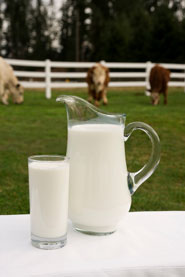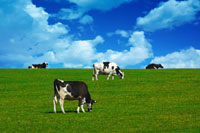
Casein Allergy
Some people have allergies or sensitivity to the milk protein casein. A casein allergy can cause intestinal gas, bloating, cramps, or even something as severe as anaphylactic shock, involving difficulty breathing, a drop in blood pressure or even loss of consciousness.
If you have a casein allergy you should minimize or avoid milk and milk products. Read food labels carefully as many foods contain milk proteins including casein. If your reactions to casein are more severe you should avoid it altogether.
If you don’t notice any adverse reactions when consuming milk products it may mean that whatever casein allergy you have is slight and you can tolerate some dairy food in your diet, or that in the case of blood type B, your body can tolerate casein proteins.
Generally people with blood type B react positively to milk and other dairy products, especially cultured fermented milk products like yogurt and kefir consumed by nomadic herders on the steppes of the Asian plains, according to Dr. Peter D’Adamo.
Remember that your immune system becomes weakened if it is constantly reacting to irritants in your diet. This causes chronic systemic inflammation, and a weakened immune system leaves you vulnerable to diseases and cancer!
There is also the alleged connection between casein and cancer. Casein is rich in the amino acid methionine, which can raise inflammation in the body due to inefficient methylation of methionine to the amino acids cysteine and taurine.
Hypo-methylation as this is called can lead to higher levels of Homocysteine, which is implicated in everything from certain cancers, to heart disease and various forms of dementia including Alzheimer’s disease.
I will write more on this topic to try to make the connection between casein and disease more clear. However if you have a casein allergy this is one more reason why it would make sense to avoid milk based products that contain casein proteins.
Opting for casein free diet would make a lot of sense and from what we know at this point, probably reduce your risk of both cardiovascular disease and cancer in later life.
Lactose Intolerance
The intolerance to lactose in dairy products seems to affect most adults. It is intolerance to a sugar in milk called lactose, rather than the protein casein. As we grow older our bodies can’t make the enzyme we need to properly digest lactose, thus making us lactose intolerant.
Lactose intolerance can occur from a loss of the enzyme lactase as we get older, from certain gastrointestinal diseases which damage lactase production, or from a genetic flaw in which a person is born without the ability to product the lactase enzyme at all.
The Untold Story of Milk, Revised and Updated:
“The History, Politics and Science of Nature’s Perfect Food: Raw Milk from Pasture-Fed Cows“
Symptoms of lactose intolerance are bloating, intestinal gas, belching, cramping and diarrhea.
The percentage of lactose intolerance seems to be lowest in Northern Europe and highest in Africa, which suggests that as humans evolved and migrated northward they began to domesticate milk producing animals and adapt to milk based foods in their diet.
The dairy industry has responded by coming up with milk products for people who are lactose intolerant. There is reduced lactose or lactose free milk, and enzymes you can add to your milk (lactaid) that help you digest it.
Pasteurization
I dealt a bit with pasteurization on my page about raw milk. It is really a form of processing for dairy products, even though it’s meant to kill bacteria such as salmonella or the bacteria that causes tuberculosis.
Pasteurization involves heating milk to slow the growth of pathogens and reduce chances of disease. Modern dairy production where cows are penned close together all but makes pasteurization necessary from a public health standpoint.
In a perfect (not to mention optimally healthy) world, there would be no pasteurization for dairy products or any other products. Pasteurization “denatures” (inactivates) proteins in the milk, significantly compromising its nutritional value.
In organic dairy farms where raw milk is produced steps are taken to prevent disease and promote the health of the cows. This makes raw milk a better choice if you want to consume milk products.
Estrogens, Growth Hormones and Antibiotics
Aside from the problems of casein allergy and lactose intolerance is the way modern dairy cows are raised and treated. Because they do not graze on grass but instead are penned and fed a grain-based diet, they are more susceptible to disease.
The mass production approach to dairy farming creates problems that necessitate the use of antibiotics to prevent disease. These antibiotics end up in the milk of the cows, and eventually in your body if you consume the dairy products made from that milk.
Estrogens and bovine growth hormones such as IGF-1 are given to cows to maximize their weight for slaughter after their milk producing days are over. These hormones as well end up in your system.
This is perhaps the most compelling reason to avoid milk based products, as you are in a sense being medicated whenever you consume products made from cows milk. Organic dairy products are a healthier alternative to this.
Choices and Guidelines
It seems clear that dairy products, especially in light of modern food processing, present some potentially serious health issues. I don’t want to oversimplify this, but here are some points I would leave you with to make your decisions easier:
If you have a lactose intolerance, then you should probably avoid dairy products altogether, unless the product is free of lactose
If you have a casein allergy, you should definitely opt for a casein free diet
If you must consume these products, then limit your consumption and whenever possible choose the organic versions
If your blood type is B, then you will likely be able to tolerate dairy, and find fermented milk products like yogurt and kefir be beneficial, but opt for raw organic dairy products over processed/pasteurized ones whenever you can
Even though most allergies and intolerance are not serious problems, you do not want to constantly set off your immune system with foods that it reacts to. If you have a casein allergy or are lactose intolerant, then dairy products should be minimized or eliminated.
The Best Sunscreen for Skin Protection





